Edie Melson's Blog, page 93
April 6, 2023
Worldbuilding 101 for Writers: Writing Language and Communication

by A.C. Williams @ACW_author
Have you ever just sat in a cafe or restaurant in another country to simply listen? That’s one of my favorite pastimes on international trips. I love to grab a cup of coffee and find a seat in a pub or a coffeeshop and watch people and listen to how they speak and what they say and how they say it. Because, let’s face it, what we say and how we say it communicates a great deal about who we are as a culture (for better or for worse).
You don’t even have to be in a different country. You could do this in your own city. Regional cultures are a thing. Even the districts within a city can be unique in their own way (someday I’ll share about the passionate divide between East and West in my comparatively small city).
Vocabulary, pronunciation, attitude, and body language can express an extraordinary amount of information about a person and what culture shaped them. That’s why language and communication are such valuable tools for developing the storyworld in your novel.
So far in this Worldbuilding 101 series, we’ve talked about Existing History and People and Social Circles. Both of those concepts are essential building blocks of creating a storyworld. (links to previous posts can be found at the end of today's post)
Today we’re going to go a bit deeper into the “People” category and talk about Language and Communication.
If you’ve read any of the PC CHILIDOG character development series, there’s a post about language and idiom that will connect with this concept in worldbuilding. For developing a character, language and idiom is part of who that character is; from the worldbuilding side, language and idiom explains WHY they are that way. Your storyworld should inform how your characters speak, move, and express themselves.
Classic example? Oh, so many. Let’s go with Hercule Poirot. Agatha Christine was a master of understanding human nature, and her famous detective Hercule Poirot is one of the most iconic figures in literature (it’s the mustache). He’s Belgian. So if he doesn’t speak like someone from Belgium, there would be a problem. If he doesn’t behave in a way that is consistent with someone from Belgium, there would be a problem. He is from Belgium, so in order to convince a reader that this is truly the case, he must act like it.
What about in Tolkien’s world? Elves speak Elvish. Dwarves speak Dwarvish. Men speak—what?—Numenorian? Unless they have a reason to speak everything (uh-hem, Aragorn), those languages generally stay within their individual cultures.
I read an article some time ago about a shepherding culture in the mountains somewhere in Europe that communicates by whistling. The distances they have to communicate over are too vast for voices to travel, but whistles work.
I have a friend who spent a summer in Papua New Guinea and realized quickly that a rather large part of their language is non-verbal (like everyone’s language, frankly). But in PNG it’s very much in the face. You can apparently have an entire conversation with your eyebrows.
From personal experience, I can tell you that in Guatemala if you compare someone to an animal, it’s a huge insult. So you can’t say “the kids are behaving like monkeys” or “that guy is strong as an ox” without terribly offending someone. It’s a cultural thing that dates back to the conquistadors.
The language and word choice your characters use must be based on the culture where they originated or where they spent the majority of their time.
Does the culture you’re building favor large families and chaotic meal times? Maybe there should be hand signals for when to pass the salt at dinner.
Does the culture you’re designing only hear certain frequencies of sound? Maybe they need to communicate using colors instead.
Is the world you’re building underwater? That will wreak havoc with spoken communication just in general.
Part of constructing a believable storyworld is making sure that your cultures and characters remain consistent in how they speak to each other.
So if you’ve already got a character who communicates in a specific way, that’s great. Build your world and its forms of communication around what your character already does. Just be sure you can explain it.
If you prefer to start from the ground up, begin with the world. Is it a desert planet that worships giant sandworms? Is it a water planet full of pirates and bounty hunters? Is it an old fashioned train full of passengers with murderous motives? How would people from those worlds communicate with each other? How would they communicate with people from another world?
TWEETABLE
 Award-winning author, A.C. Williams is a coffee-drinking, sushi-eating, story-telling nerd who loves cats, country living, and all things Japanese. She’d rather be barefoot, and if she isn’t, her socks won’t match. She has authored eight novels, two novellas, three devotional books, and more flash fiction than you can shake a stick at. A senior partner at the award-winning Uncommon Universes Press, she is passionate about stories and the authors who write them. Learn more about her book coaching and follow her adventures online at https://www.amycwilliams.com.
Award-winning author, A.C. Williams is a coffee-drinking, sushi-eating, story-telling nerd who loves cats, country living, and all things Japanese. She’d rather be barefoot, and if she isn’t, her socks won’t match. She has authored eight novels, two novellas, three devotional books, and more flash fiction than you can shake a stick at. A senior partner at the award-winning Uncommon Universes Press, she is passionate about stories and the authors who write them. Learn more about her book coaching and follow her adventures online at https://www.amycwilliams.com.
Published on April 06, 2023 22:00
April 5, 2023
Inspiration & Encouragement for the Writer Who Has Nothing to Write
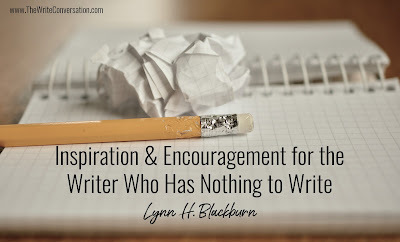
by Lynn H. Blackburn @LynnHBlackburn
I gotta be honest with y’all. I didn’t have anything to write about this month. So I decided to write about not having anything to write about.
Sometimes there’s this perception that writers should always be writing.
I am not one of those writers. I know this. And that is why I’m not freaked out about the fact that I have nothing to write about.
There are some writers who write every day, and they have a fairly steady output of words. (Hint: this is not me).
Then there are writers who write an insane number of words in order to meet a deadline, or because they are feeling super inspired. But when that massive output is over, they can’t write a new story to save their life. (Hint: this is me).
The first time I realized that I couldn’t write immediately after a deadline, I panicked. Did this mean I wasn’t a real writer? Did this mean I had written my last book?
Why was I compelled to knit, crochet, cook, plant flowers (which I was almost sure to kill), listen to music, watch TV, go to movies, go to concerts, clean out cabinets, or, sometimes, just being transparent here, lie on my bed and stare at the ceiling fan, but couldn’t come up with a coherent thought about my next story?
I still don’t have all the answers. But after some study and some time, I know some of the reasons I am the way I am. And for the things I don’t understand, I’ve learned to accept that this is how I’m wired.
I’m the kind of writer who needs a lot of input in order to have any output. My preferred method of input is story, but right after a deadline, looking at words makes me cranky. So I get my stories with audiobooks. I listen to a lot of music, watch TV or movies, sports, and if possible, see some form of live theater or concert.
I’m also the kind of writer who always needs to be learning something new. This is probably why as soon as I hit send on this blog post, I’ll be studying Latin. This is also why immediately after a deadline I find myself experimenting with random things like new crochet stitches or new recipes. My brain is begging me for new information, so I’ve learned to give it what it wants.
I’m the kind of writer who needs time—sometimes a lot of time—to think and process. I’ve been thinking about and processing the story I just turned in for a year. My brain isn’t ready to switch gears to the new story.
But unlike in the past, where this deep-seated withdrawal scared me, now, I recognize it and lean into it.
I’m not worried about it.
But here’s what I am doing instead of writing:
I’m learning Latin, planting flowers, and listening to political thrillers on audiobook.I’m cleaning out cabinets and closets and doing laundry and organizing my office.I’m crocheting so much that I’ve even taken my latest little washcloth project to a baseball game. (My kids know I’m weird, so I’m leaning into that, too). I’m exercising and taking care of household things that were shoved to the side while my deadline was my all-encompassing focus.
But I’m not trying to write. Not yet.
As I write this blog post, my deadline was a month ago. By the time you read this, I’ll probably be working on the revisions for that book. Because I’ve given myself this past month to refuel in the way that works for me, I’ll be ready to handle that (famous last words—send chocolate).
And sometime in May, maybe June, but it feels like it will be May, I’ll open a new Scrivener file and start writing again. I know I will because I can feel that new story itch. It was indiscernible a month ago. But it’s there now, on the very edge of my thoughts.
I’m sharing this with you—700 words about not having anything to write about—because I hope it will encourage you to pay attention to your natural creative rhythms. To extend yourself some grace. To remember that you are unique, and your creative process is uniquely yours.
Embrace it.
Grace and peace,Lynn
TWEETABLEInspiration & Encouragement for the Writer Who Has Nothing to Write from author @LynnHBlackburn on @EdieMelson (Click to Tweet)
 Lynn H. Blackburn loves writing romantic suspense because her childhood fantasy was to become a spy, but her grown-up reality is that she's a huge chicken and would have been caught on her first mission. She prefers to live vicariously through her characters and loves putting them into all kinds of terrifying situations while she's sitting at home safe and sound in her pajamas!
Lynn H. Blackburn loves writing romantic suspense because her childhood fantasy was to become a spy, but her grown-up reality is that she's a huge chicken and would have been caught on her first mission. She prefers to live vicariously through her characters and loves putting them into all kinds of terrifying situations while she's sitting at home safe and sound in her pajamas! Unknown Threat, the first book in her Defend and Protect series, was a 2021 Christy Award finalist and her previous titles have won the Carol Award, the Selah Award, and the Faith, Hope, and Love Reader’s Choice Award. Malicious Intent, the second book in the series, released March 2022.
She is a frequent conference speaker and has taught writers all over the country. Lynn lives in South Carolina with her true love and their three children. You can follow her real life happily ever after by signing up for her newsletter at LYNNHBLACKBURN.COM and @LynnHBlackburn on BOOKBUB, FACEBOOK, TWITTER, PINTEREST, and INSTAGRAM.
Published on April 05, 2023 22:00
April 4, 2023
Tips to Write Exotic Settings Your Readers Will Love

by Sarah Sally Hamer @SarahSallyHamer
First, what is an exotic setting? Actually, it’s as simple as any place you don’t know. Paris, France, may be exotic to someone who lives in South Texas but, on the other hand, South Texas could be unusual to someone who lives in Paris. After all, beauty is in the eye of the beholder!
Setting is as important to a story as any of the other aspects: characters, dialog, plot—and can do as much for your story.
Ways Setting Can Add to the Story You're WritingIt can create theme. A cozy mystery is almost always set in a small town where everyone knows everyone else. The setting for that mystery is completely different than a police procedural set in a large California town. Compare “Murder She Wrote” to “The Streets of San Francisco.” They are both basically stories based on the solving of a murder but couldn’t be any more different in the way the characters deal with their surroundings.It can create tone. Similar to theme, tone is more specific and allows the reader to really feel they are in the jungle with George or in the Apollo 13 with Jim Lovell. Details matter, with the frozen hot dog being the perfect image of how cold it was in space.It can create deeper characterization. Setting often (and should!) intimately reflect a character’s state of mind. Imagine your protagonist has just walked into a restaurant to meet a friend for dinner. What does the room look like? How about the people who are in it? If she’s just been dumped by her boyfriend, her “take” is going to be MUCH different than if she’d just gotten an engagement ring. Everything in the room—the color of the walls, the smell of food, the smile of the server—will irritate her if she’s angry, and maybe she’ll even snap at the server when she’s offered a glass of wine. But if that ring finger has a nice, new diamond on it, she’ll love everything about the restaurant and may even ask for champagne. It can move the story forward. Just as a character experiences changes throughout a story, so can a setting. Back to the restaurant example. Our protagonist will “see” it differently depending on how she feels. So an author can open a window, so to speak, into how the character is evolving by describing the restaurant a little differently each time she walks in.It can allow for interesting details. I love history, so I try to add in historical information every chance I get. In a paranormal romance I wrote set in New Orleans, I added as many details as possible to help with the ambiance. Talk about an exotic location! Even without the party atmosphere, there are thousands of things I can describe to give the “flavor” of an amazing place.
A couple of things to be careful of when using setting.Don’t give too much description. The story is about the character, not the location. “Attach” the character to his or her setting. Setting doesn’t mean much if there’s not a character to experience it.Be careful not to use all your fascinating research in the story. Keep it salient and concise, with just a whiff of detail.
I think most readers feel the same way I do—reading a book allows me to walk away from reality and imagine myself in some distant place, where I can immerse myself in the heat and blue skies of Greece, the wild highlands of Scotland, or the vastness of outer space. The beauty of writing stories allows us to give them that pleasure.
What’s your favorite setting in a book? Mine right now is Egypt as I’m reading Agatha Christie’s Death on the Nile one more time.
TWEETABLETips to Write Exotic Settings Your Readers Will Love from @SarahSallyHamer on @EdieMelson (Click to Tweet)
 Sarah (Sally) Hamer, B.S., MLA, is a lover of books, a teacher of writers, and a believer in a good story. Most of all, she is eternally fascinated by people and how they 'tick'. She’s passionate about helping people tell their own stories, whether through fiction or through memoir. Writing in many genres—mystery, science fiction, fantasy, romance, medieval history, non-fiction—she has won awards at both local and national levels, including two Golden Heart finals.
Sarah (Sally) Hamer, B.S., MLA, is a lover of books, a teacher of writers, and a believer in a good story. Most of all, she is eternally fascinated by people and how they 'tick'. She’s passionate about helping people tell their own stories, whether through fiction or through memoir. Writing in many genres—mystery, science fiction, fantasy, romance, medieval history, non-fiction—she has won awards at both local and national levels, including two Golden Heart finals.A teacher of memoir, beginning and advanced creative fiction writing, and screenwriting at Louisiana State University in Shreveport for over twenty years, she also teaches online for Margie Lawson at www.margielawson.com. Sally is a freelance editor and book coach at Touch Not the Cat Books, with many of her students and clients becoming successful, award-winning authors.
You can find her at hamerse@bellsouth.net or www.sallyhamer.blogspot.com
Published on April 04, 2023 22:00
April 3, 2023
Writing Dialogue Worth Quoting
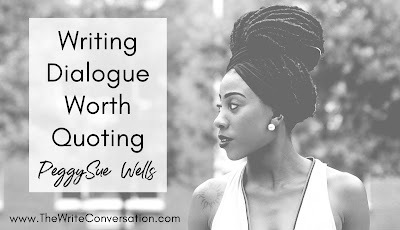
By PeggySue Wells @PeggySueWells
Like delicious desserts, dialog is often a reader’s favorite part of a story. We quote great dialog for generations. As writers, it’s important we are intentional about writing dialogue worth quoting.
“Off with her head!” – Lewis Carroll.
“We make a living by what we get, we make a life by what we give.” – Winston Churchill.
“There’s so much scope for imagination.” – Lucy Maud Montgomery.
“It’s me again, Hank the Cowdog.” – John Erickson.
“It is only with the heart that one can see rightly; what is essential is invisible to the eye.” – Antoine de Saint-Exupéry.
“Give back to Caesar what is Caesar’s and to God what is God’s.” – Jesus Christ.
My family has admitted that if film and book quotes were removed, our vocabulary would be reduced by half. How about you? Do you quote dialog? How many of these can you place?
Go ahead, make my day.All that is gold does not glitter, Not all those who wander are lost.Whatever our souls are made of, his and mine are the same.Wish I could say yes, but I can’t.This above all: To thine own self be true.Stupid is as stupid does.I’m gonna make him an offer he can’t refuse.Anything worth dying for is certainly worth living for.God bless us, everyone.You should be kissed and often, and by someone who knows how.You're braver than you believe, stronger than you seem, and smarter than you think.Love is patient. Love is kind. It does not envy. It does not boast, it is not proud. It is not rude, it is not self-seeking, it is not easily angered. It keeps no record of wrongs. Love does not delight in evil but rejoices with the truth. It always protects, always trusts, always hopes, always perseveres.The one thing that doesn't abide by majority rule is a person's conscience.We’re not in Kansas anymore.Snap out of it.Sometimes, I’ve believed as many as six impossible things before breakfast.Houston, we have a problem.Show me the money.I feel the need, the need for speed.There is no try, only do.Is the sun up? Put it on your left.You complete me.Get your stinking paws off me, you dirty ape.Wax on, wax off.Shaken, not stirred.I can do this all day.Hasta la vista, Baby.You’re gonna need a bigger boat.Do I love you? My god, if your love were a grain of sand, mine would be a universe of beaches.Just keep swimming.My precious.You is kind, you is smart, you is important.You had me at hello.Help me, Obi Won Kenobi, you’re my only hope.I wish I had done everything with you. To infinity and beyond.You must allow me to tell you how ardently I admire and love you.Every time a bell rings, an angel gets his wings. Of all the gin joints in the world, she walks into mine. No touchy.All we have to decide is what to do with the time that is given us.There’s no place like home.You can be my wingman any day.
As writers, how do we craft words into dialog that outlives our writing? What are the common ingredients that make a piece of dialog live beyond the story? We will talk about the making of dynamic dialog next.
In the meantime, what dialog from a book or film do you quote?
TWEETABLEWriting Dialogue Worth Quoting from @PeggySueWells on @EdieMelson (Click to Tweet)
 Tropical island votary and history buff, PeggySue Wells parasails, skydives, snorkels, scuba dives, and has taken (but not passed) pilot training. Writing from the 100-Acre Wood in Indiana, Wells is the bestselling author of thirty books including The Slave Across the Street, Slavery in the Land of the Free, Bonding With Your Child Through Boundaries, Homeless for the Holidays, Chasing Sunrise, and The Ten Best Decisions A Single Mom Can Make. Founder of SingleMomCircle.com, PeggySue is named for the Buddy Holly song with the great drumbeat. At school author visits, she teaches students the secrets to writing and speaks at events and conferences. Connect with her at www.PeggySueWells.com, on Facebook at PeggySue Wells, and LinkedIn at linkedin.com/in/peggysuewells
Tropical island votary and history buff, PeggySue Wells parasails, skydives, snorkels, scuba dives, and has taken (but not passed) pilot training. Writing from the 100-Acre Wood in Indiana, Wells is the bestselling author of thirty books including The Slave Across the Street, Slavery in the Land of the Free, Bonding With Your Child Through Boundaries, Homeless for the Holidays, Chasing Sunrise, and The Ten Best Decisions A Single Mom Can Make. Founder of SingleMomCircle.com, PeggySue is named for the Buddy Holly song with the great drumbeat. At school author visits, she teaches students the secrets to writing and speaks at events and conferences. Connect with her at www.PeggySueWells.com, on Facebook at PeggySue Wells, and LinkedIn at linkedin.com/in/peggysuewells
Published on April 03, 2023 22:00
April 2, 2023
Writing in Obedience When God Says, Again
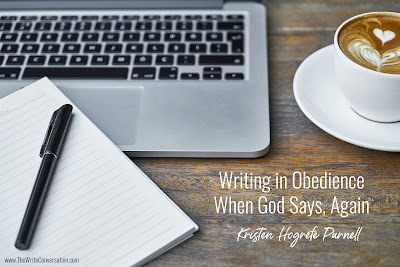
By Kristen Hogrefe Parnell @khogrefeparnell
The email finally came with the editor’s response to your proposal, and the answer was no. The finalists were announced, and your name wasn’t included.
No matter how long we’ve been writing, none of us is immune to disappointment. Sometimes, it feels as if our hard work gets swept under the rug, and someone stamps “start over” on our foreheads. We feel as if our good still isn’t good enough.
If you’re feeling low or a little lost in the wake of writing rejection, you’re not alone. The best remedy is to take our disappointments to Jesus and see how His living Word speaks to—and reinspires—the gift of words He has given us. There, we find the good when God says “again.”
Go wash again
Naaman was captain of the host of the king of Syria. He was a man of honor, but he was a leper (2 Kings 5:1). When he finally received an opportunity for healing, he became angry that it involved the muddy Jordan river. And not just one dunk in it, but seven! Yet the prophet Elisha instructed him to simply wash seven times in its waters, and he would be healed.
In Scripture, seven is often referred to as the number of perfection. If it hadn’t been for Naaman’s servant’s pleading, this proud captain would have refused the “disgrace” of following this lowly task.
I wonder if Naaman started to notice a difference in his skin the first or even the sixth time that he washed. Scripture doesn’t say. I like to think it was the seventh wash—the one that required final obedience and faith—that made the difference.
Maybe we too need to wash again. Humility can be healthy, not only for healing, but for personal growth. We can gain a new perspective of our work and move forward from this moment ready to begin again.
I can’t promise you that six rejections later, you’ll get the response you want on the seventh. But I do believe that if you are faithful to the gift God has given you, He will use your writing and open doors in His time.
Go watch again
In I Kings 18, Israel hadn’t seen rain for three years and six months (Luke 4:25, James 5:17). As a result, you can imagine King Ahab’s surprise when Elijah said, “… there is the sound of abundance of rain” (I Kings 18:41b NKJV).
Although there was still no rain, we see Elijah’s faith in these words. God had told him He would “send rain upon the earth” when Elijah went to see this wicked king (I Kings 18:1). Elijah’s obedience showed he believed God.
But Elijah wasn’t the only one exercising faith and obedience. Elijah told his servant to go look toward the sea to see if the rain was coming yet. Not once, but you guessed it, seven times, the servant had to go watch again for rain. “So he went up and looked, and said, ‘There is nothing.’ And seven times he [Elijah] said, ‘Go again’ (I Kings 18:43b).
There is nothing. Sometimes, we feel that way about our writing. Is it coming to nothing?
On the seventh time, the servant reported to Elijah that he spotted a cloud, “as small as a man’s hand” (I Kings 18:44). That small cloud quickly grew to a heavy rainstorm.
The truth is, we don’t know if our writing will remain small or grow. We don’t know what its reach will be. That isn’t the point. The point is: Are we going to be obedient and faithful with the writing gift God has entrusted to us? Are we going to go write again?
Sure, disappointments can be as chalky to swallow as the Jordan River is muddy. But when God says “again,” we can trust He has a reason for doing so. Therein lies the beauty of faith. Obedience doesn’t always understand. Obedience simply does.
How is God asking you to be obedient to your calling as a writer today? Even if the instructions seem confusing or muddy, let’s write in obedience.
TWEETABLEWriting in Obedience When God Says, Again insight from @KHogrefeParnell on @EdieMelson (Click to Tweet)
 Kristen Hogrefe Parnell writes suspenseful fiction from a faith perspective for women and young adults. Her own suspense story involved waiting on God into her thirties to meet her husband, and she desires to keep embracing God’s plan for her life when it’s not what she expects. Kristen’s books have won the Selah Award and the Grace Award, among others, and her romantic suspense novel Take My Hand is now available. An educator at heart, she also teaches English online and enjoys being a podcast guest. Kristen lives in the Tampa, Florida area with her husband and baby boy. Visit her online at KristenHogrefeParnell.com.
Kristen Hogrefe Parnell writes suspenseful fiction from a faith perspective for women and young adults. Her own suspense story involved waiting on God into her thirties to meet her husband, and she desires to keep embracing God’s plan for her life when it’s not what she expects. Kristen’s books have won the Selah Award and the Grace Award, among others, and her romantic suspense novel Take My Hand is now available. An educator at heart, she also teaches English online and enjoys being a podcast guest. Kristen lives in the Tampa, Florida area with her husband and baby boy. Visit her online at KristenHogrefeParnell.com.
Published on April 02, 2023 22:00
April 1, 2023
Words That Never Fail a Writer
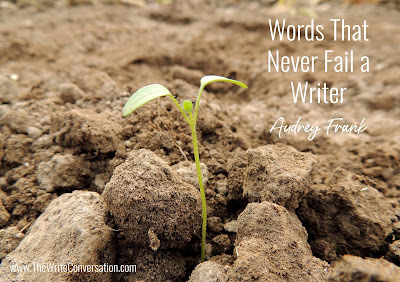
by Audrey Frank @AudreyCFrank
As the rain and snow come down from heaven, and do not return to it without watering the earth and making it bud and flourish, so that it yields seed for the sower and bread for the eater, so is my word that goes out from my mouth: it will not return to me empty, but will accomplish what I desire and achieve the purpose for which I sent it (Isaiah 55:10-11).
The happiness inside spilled from her smile and galloped right out of those deep brown eyes. She held out a treasured, crumpled piece of paper.
Look!
Reverently, I opened the little bundle. 20 baby beans, smooth and freckled.
They never fail!
By the day’s end, she had tucked them in the overturned earth, nestled each one carefully between the maize mounds. We lived deep in East African bush country during a time of famine. The tribe depended on maize and cassava to live. Beans were a new introduction meant to support the soil and provide a more resilient source of protein.
Those stubborn seeds survived even without rain. They grew, and they grew. Like Jack’s beanstalk, I watched them reach across the dusty rows and grab neighboring cornstalks. When the monsoon rains finally, gloriously fell like a waterfall from the heavens, green leaves exploded everywhere. The sound of my friend’s laughter ricocheted off the surrounding hills.
Some seeds never fail to produce a crop.
The word of God is like that. We writers are like so many seed-bearers, our little guarantees wrapped carefully in paper, ready for planting in the hearts and minds of readers.
We can plant many kinds of seeds. But there’s one that brings a crop every time, guaranteed.
God has given us purpose-words, power-words that yield seed for the sower and bread for the eater. They are found in the Bible. These words interact with the soil of human hearts, taking root below and bearing fruit above.
On a good day, my words might be eloquent. On a bad day, unclear. With my words, I might gather a little fan club of followers and with my words, I might make someone remember me.
But I am not guaranteed. I come, and I go. I am faithful and unfaithful. I show up, and I fail to show up. I am human, and I have limits.
God’s words have no limit. I know they bear a guarantee my own words never will. They will not fail to accomplish what God desires and achieve the purpose for which He sent them.
Like my friend, I can run to others, bearing my treasured packet of seeds, happiness spilling out the corners of my eyes and shimmering across my face as I bounce up and down with joy that I can plant such marvelous seeds in my garden.
They never fail!
Lord, may I plant your seeds through my writing today. Amen.
TWEETABLEWords That Never Fail a Writer, insight from author @AudreyCFrank on @EdieMelson (Click to Tweet)
 Audrey Frank is an author, speaker, and storyteller. The stories she shares are brave and true. They give voice to those whose words are silenced by shame, the hard things in life that don’t make sense, and the losses that leave us wondering if we will survive. Audrey and her family have spent over twenty years living and working among different cultures and world views, and she has found that God’s story of redemption spans every geography and culture. He is the God of Instead, giving honor instead of shame, gladness instead of mourning, hope instead of despair. Although she has three different degrees in communication and intercultural studies, Audrey’s greatest credential is that she is known and loved by the One who made her.
Audrey Frank is an author, speaker, and storyteller. The stories she shares are brave and true. They give voice to those whose words are silenced by shame, the hard things in life that don’t make sense, and the losses that leave us wondering if we will survive. Audrey and her family have spent over twenty years living and working among different cultures and world views, and she has found that God’s story of redemption spans every geography and culture. He is the God of Instead, giving honor instead of shame, gladness instead of mourning, hope instead of despair. Although she has three different degrees in communication and intercultural studies, Audrey’s greatest credential is that she is known and loved by the One who made her.Audrey is the author of Covered Glory: The Face of Honor and Shame in the Muslim World (Harvest House Publishers), an outpouring of Audrey’s heart to introduce others to the God of Instead. Shame is not unique to the developing world, the plight of the women behind veils, young girls trafficked across borders; shame is lurking in hearts everywhere. Through powerful stories from women around the world, Covered Glory illuminates the power of the Gospel to remove shame, giving honor instead. Available at favorite booksellers: BARNES & NOBLE , BOOKS A MILLION, AMAZON.
Published on April 01, 2023 22:00
March 31, 2023
A Writer’s Idea Germinator
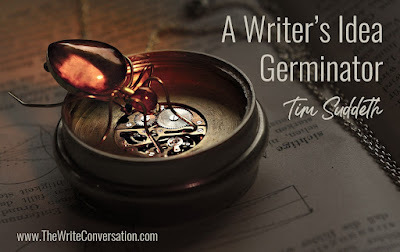
by Tim Suddeth @TimSuddeth
I’ve been writing for The Write Conversation since January 2017. Amazing, isn’t it? I thought it wouldn’t last. What did I know about writing?
And I still feel that way. It seems the more I learn about writing, the more I learn I don’t know that much about it.
Recently, I started reading Lawrence Block’s Telling Lies for Fun and Profit. Block is a Shamus and Edgar-awards winner and an author of over forty novels (many under pseudonyms). And for many years, he wrote an article on writing for Writers Digest.
In his preface to Telling Lies, he makes a comment that nails how I often feel about writing a monthly post for The Write Conversation. Block writes that once or twice a year, while he was writing his articles, his editor would ask him for a list of his upcoming column topics. He says that it would have been easier to “supply maps of the far side of the moon. More often than not, I complete each column I’ll have to give up the job, that I’ll never again be able to come up with a viable theme for a column. Somehow, within the next thirty days a topic suggests itself and I find a way to approach it. I’ve learned to take it on faith that this will happen.”
Here, here. That has been my experience writing this column for the last six years. Most months, I’m ready to tell Edie I have to quit because I don’t have a clue for a new idea. (Oops, please don’t tell Edie. Let’s keep that our little secret.) But then, toward the end of the month, something begins wriggling in the back of my brain. (Our spec readers should like that.)
Whether you’re a new writer or have been writing for years, there is often a worry that you’re running out of ideas. Block illustrates this fear by talking about a raft. You’re sitting on the raft, taking boards from both ends to make a fire to keep warm. You can either replace the boards (ideas) or bye-bye boat.
If you don’t continue creating new ideas, you’ll run out of stories.
Here are some suggestions for how to continue to come up with ideas and stories.
1. Stay out of ruts.
Routines can be good. They can save us time and let us complete mindless tasks while we think about something else. But it is that mindlessness that can be the enemy to finding new ideas.
My wife laughs at me because whenever we go somewhere, she never knows how we are going to get there. And neither do I. I like to take different ways so I can see more of the country. Going the same way may give you time to run through your thoughts, but how many times have you arrived somewhere and have no idea how you got there?
By taking different routes, not doing things the same way, you open yourself to the opportunity to see or experience something new.
2. Be conscious of your surroundings.
A popular question writers get asked often is, where do you get your ideas? I want to say, “Open your eyes. Our world is packed full of them.”
Notice the city streets around you, the sights, the sounds. Look at the fields and trees surrounding you. Are there any plants or animals? Is the wheat swaying with the breeze? I just saw a hawk being chased off by a jay and thought what a lesson that showed.
3. Don’t stop learning.
Whether you do it formally by taking a course or watching a podcast or informally by reading or starting a hobby, never stop learning. The more you learn, and the more eclectic your learning, the more unique and three-dimensional your ideas will be.
And don’t limit your learning to your writing topics. If you set strict expectations to what you study, you might miss those God moments He plans to surprise you with.
Block mentions a course he planned to take in architecture. “I don’t know how the course will benefit my writing, and I don’t have to know, because input is a different thing altogether from research. The latter looks for answers where the former isn’t even aware of the questions.”
4. Hang out.
Writers tend to be a solitary bunch and the pandemic just fed our hermit tendencies. But staying inside, in our ruts, with the same old same old is not a productive way to get new ideas.
Go to where the people are. Find the energy that comes from (gulp) a crowd.
Travel. Whether it’s to a local event or to a new city. The key thing is to open yourself up to new experiences.
Our world, God’s wonderful creation, is a fertile ground for new ideas. (Solomon was wrong when he said that there is nothing new under the sun. Remember, he said that in the Old Testament.)
The question isn’t where to go to get ideas, but will we be open to them when they pop up?
Where do you find your ideas?
TWEETABLEA Writer's Idea Germinator, insight from @TimSuddeth on @EdieMelson (Click to Tweet)
 Tim Suddeth is a stay-at-home dad and butler for his wonderful, adult son with autism. He has written numerous blogs posts, short stories, and three novels waiting for publication. He is a frequent attendee at writers conferences, including the Blue Ridge Mountain Christian Writers Conference and a member of Word Weavers and ACFW. He lives near Greenville, SC where he shares a house with a bossy Shorky and three too-curious Persians. You can find him on Facebook and Twitter, as well as at www.timingreenville.com and www.openingamystery.com.
Tim Suddeth is a stay-at-home dad and butler for his wonderful, adult son with autism. He has written numerous blogs posts, short stories, and three novels waiting for publication. He is a frequent attendee at writers conferences, including the Blue Ridge Mountain Christian Writers Conference and a member of Word Weavers and ACFW. He lives near Greenville, SC where he shares a house with a bossy Shorky and three too-curious Persians. You can find him on Facebook and Twitter, as well as at www.timingreenville.com and www.openingamystery.com.
Published on March 31, 2023 22:00
March 30, 2023
How Writers Can Keep Their Focus on the People Instead of the Numbers of Social Media
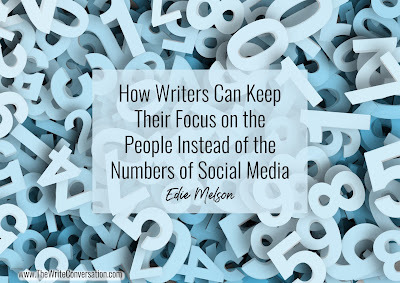
by Edie Melson @EdieMelson
Social media stresses a lot of people out, but it doesn’t have to.
One of the biggest issues is that people tend to approach it with a have-to-do, legalistic mindset. Truthfully, because successful social media is all about relationship building, it works best when we treat it organically.
Because it’s easier to manage with a set of guidelines:Be consistent.Avoid self promotion.It’s easy to get caught up in the to do list and forget the point.
They’re not numbers, they’re people.
We even begin to judge the worth of what we have to say by those numbers. Let me remind you why you’re doing what you’re doing. Why you sweat over a keyboard, struggling to find the right word. Why you risk rejection by submitting those carefully crafted words to editors, agents and contest judges.
We’re doing it because we want to make a difference in the world around us—a world made up of people. If all we’re looking for is higher numbers, we’ve missed the point. We’ve set a course that follows certain frustration and ultimate failure. So if it’s not for the numbers, then what’s the point? Why even bother with social media?
The point is what the numbers represent…the point is the individuals who can be impacted by what we write…challenged by what we say…changed by what we share.
When I get caught up chasing the numbers, the significance of what I’m doing diminishes. But when I step away from the race and concentrate on who I’m writing for and who I’m writing to, things fall back into place.
I’m first and foremost a writer. For me, social media is a tool. It’s the means to an end. It helps me find my audience. But when I begin to measure my worth as a writer through the numbers of social media, I’ve gotten off course.
My worth is not determined by my numbers.
For me, the blog posts that mean the most are rarely the ones that generate the highest numbers. The ones that mean the most are those that help someone, that connect the dots for an individual who’s hurting or help someone who’s frustrated finally see the light. It’s when I pen those words that I feel true satisfaction in my calling.
Here are some other things we need to remember:It’s God who provides the reach, we only need to be faithful to do our part.We build relationships one person at a time.I remind myself that it’s not about me.
How about you? How do you avoid the trap of legalistic social media? Be sure to share your thoughts in the comments section below.
Don’t forget to join the conversation!Blessings,Edie
TWEETABLEHow Writers Can Keep Their Focus on the People Instead of the Numbers of Social Media from @EdieMelson (Click to Tweet)
 Edie Melson is a woman of faith with ink-stained fingers observing life through the lens of her camera. No matter whether she’s talking to writers, entrepreneurs, or readers, her first advice is always “Find your voice, live your story.” As an author, blogger, and speaker she’s encouraged and challenged audiences across the country and around the world. Her numerous books reflect her passion to help others develop the strength of their God-given gifts and apply them to their lives. Connect with her on her WEBSITE, through FACEBOOK, TWITTER and on INSTAGRAM.
Edie Melson is a woman of faith with ink-stained fingers observing life through the lens of her camera. No matter whether she’s talking to writers, entrepreneurs, or readers, her first advice is always “Find your voice, live your story.” As an author, blogger, and speaker she’s encouraged and challenged audiences across the country and around the world. Her numerous books reflect her passion to help others develop the strength of their God-given gifts and apply them to their lives. Connect with her on her WEBSITE, through FACEBOOK, TWITTER and on INSTAGRAM.
Published on March 30, 2023 22:00
Stay on Track with Your Writing By NEVER Saying These 15 Things!
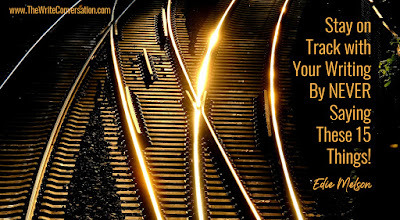
by Edie Melson @EdieMelson
Writers are an odd lot.
I can say that, because I am one. So I speak from experience, not judgment. Like all creative people, we tend to feel things more deeply, reacting poorly to criticism.
We also have no perspective at all when it comes to our own creations. Because a lot of us begin writing as a hobby, we also seem to have a lop-sided view of the publishing industry.
So today, I’d like to clear up some common misconceptions and share some things that successful writers never say.
Writers Should NEVER Say These 15 Things!
1. Uh…I guess…uh…I write. So…I suppose that makes me a writer…sometimes. CUT. IT. OUT. If you are serious about writing, even if you don’t get paid, you can call yourself a writer. So repeat after me. “I am a writer.”
2. I’m a much better writer than the majority of the published writers out there. This is for the small percentage who don’t have trouble telling everyone, “I am a writer.” Some of you believe you know more than everyone else. I hate to break it to you, but you don’t.
3. Sure I'll go to lunch with you, I don’t need to write regularly. Successful writers make spending time putting words on paper (or a screen) a priority. If we want to be taken seriously and have our time respected, we must set the example.
4. I don’t need to read books. I’m a writer, not a reader. Besides, I don’t have time to read. I am not kidding. I’ve actually had writers tell me this. We need to spend time reading, and reading widely. Read outside your genre and learn what works and what doesn’t.
5. I don’t need an editor. I have a sharp eye and can catch anything I need to in my writing. Yes, many of us do have an editor’s eye. That’s a good thing. But that is NO substitute for an editor. We are blind when it comes to our writing. We see what is supposed to be on the page, not what is.
6. I can’t afford to attend conferences. I know conferences are expensive, but they’re also vital to moving forward in your writing career. There are a lot of ways to fund a conference—from asking for money from family and friends instead of gifts for holidays, to writing small articles for pay and saving that money. Conferences do three MAJOR things for writers:They provide a place to learn the latest industry standards and techniques.They provide a place to network and talk to writing professionals, like editors, agents and published writers.They provide a place to network with other writer.
7. I decided to self-publish because traditional publishing just takes too long. I’m glad to say that self-publishing—when done with professionalism—is now a well-respected option. Beyond that, there are a lot of good reasons to self-publish. But using self-publishing as a short cut is NOT a good reason.
8. I don’t have a target audience, everyone loves what I write. Every book has a primary audience. Yes, there are books that a lot of people enjoy. But if you write to a specific audience, you’ll have a much better finished product. Not to mention the fact that book stores will know where to shelve your book.
9. The rules don’t apply to me. Yes, I’ll be the first one to agree that there are exceptions to almost every single rule you ever hear about writing and/or publishing. BUT we can’t look at ourselves as that exception. Follow the rules and let the exceptions be a wonderful surprise if and when they happen.
10. The first part of my book is just information the reader needs, the story starts on page 70 (40, 60, 90, etc.). I really have lost track of the number of times I’ve had an author say this to me. Here is my response. If the story starts on page 70, that’s where your book needs to start. Trust your reader, and trust yourself, and skip the background information.
11. I’m not a marketer, I’m a writer. If this really is true and you absolutely refuse to market your work, then be prepared to pay. You’ll have to hire someone to market your book because marketing is a joint partnership between the publisher and the writer. That’s just the way publishing works today.
12. The publishing industry is dying. No, not really. It’s definitely changing, but it’s not dying. There’s a difference. Learn to adapt with the changes, but realize books and people who write them aren’t going anywhere.
13. I already have a book contract, I don’t need a literary agent. Now you need one more than ever. There are those who will argue this point, but here are my thoughts. Because of the rapid changes in publishing, contracts are brutal. You need someone in your corner, advocating for you. After the contract, you still need someone to help with possible (really probable) hiccups in the publishing process. If you don’t like your cover, or the copy editor isn’t doing a good job, your agent can be the bad guy and go to bat for you. This makes it possible for you to stay on good working relations with the publisher.
14. I don’t need to work on social media until after I have a contract. This is another that makes me cringe. Editors and agents award book contracts based on a lot of things. Now days, one of those things is whether or not an author has solid online presence. The lack of a presence may not always keep you from getting a contract, but it will affect the way you’re viewed by prospective buyers. Smart writers build an online presence while they’re working on a book, so everything is in place when they begin pitching.
15. Published authors don’t need to take classes or read books on writing. Successful writers know there’s never a point when you’ve arrived. Lifelong learning isn’t just a buzzword, it’s vital to stay current in the publishing industry.
Even though I slanted a lot of the points toward books, all are equally applicable to writers of shorter works. These are things that I believe you’ll never hear a successful writer say. I’d love to know what you’d add to this list. Be sure to leave your thoughts in the comments section below.
Don’t forget to join the conversation!Blessings,Edie
TWEETABLEStay on Track with Your Writing By NEVER Saying These 15 Things! from author @EdieMelson (Click to Tweet)
 Edie Melson is a woman of faith with ink-stained fingers observing life through her camera lens. She’s a writer who feels lost without that device & an unexpected speaker who loves to encourage an audience. She also embraces the ultimate contradiction of being an organized creative. She knows the necessity of Soul Care and leads retreats, conferences & workshops around the world on staying connected to God. Her numerous books, including the award-winning Soul Careseries & reflect her passion to help others develop the strength of their God-given gifts. Her blog, The Write Conversation is recognized as one of the top 101 industry resources.
Edie Melson is a woman of faith with ink-stained fingers observing life through her camera lens. She’s a writer who feels lost without that device & an unexpected speaker who loves to encourage an audience. She also embraces the ultimate contradiction of being an organized creative. She knows the necessity of Soul Care and leads retreats, conferences & workshops around the world on staying connected to God. Her numerous books, including the award-winning Soul Careseries & reflect her passion to help others develop the strength of their God-given gifts. Her blog, The Write Conversation is recognized as one of the top 101 industry resources. She and husband Kirk have been married 40+ years and raised three sons. They live in the foothills of the Blue Ridge Mountains and can often be found hiking—with Edie clinging to the edge of a precipice for the perfect camera angle and Kirk patiently carrying her camera bag and tripod. Connect with her on her website, www.EdieMelson.com and through social media.
Published on March 30, 2023 22:00
March 29, 2023
26 Social Media Tips for Writers
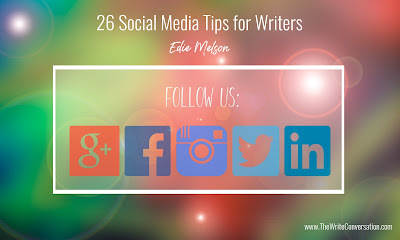
by Edie Melson @EdieMelson
Social Media doesn’t have to be difficult. These tips can take you farther, faster if you implement them into your social networking strategy.
The ABCs of Social Media
A is for Answer. Think about the questions your target audience has and use social media to give them the answers. For instance, my followers want to learn how to use social networking efficiently, so I Tweet short-cuts, tips and easy solutions that take up very little time.
B is for Basics. Whatever you’re doing, make it excellent. That means take time to check for typos and readability, in your Tweets, Facebook posts and in your blog. Also be sure you’re using giving accurate links. There’s nothing more frustrating than clicking on a link that takes you nowhere.
C is for Conversation. Remember social networking is all about interaction between people. It’s NOT talking at them...it’s talking with them.
D is for Direction. Think about what you’re trying to accomplish and be deliberate.
E is for Effort. Social Networking feels like it should be easy. But learning a new language is never done without expending effort.
F is for Friends and Followers. These are the basis of your social interaction online. Don’t neglect them and only chase new connections. Be true to this foundation and it will sustain you over the long haul.
G is for Grace. We all say things on social media that can be taken several ways. By giving one another grace and the benefit of the doubt, we can head off lots of hurt feelings.
H is for Hashtags. These are the gems in the fields of Twitter. Learn to follow Hashtags and use them correctly to increase your cyber-reach. Here's a post I wrote on how to Reach Your Blog Readers by Learning to use Hashtags, Titles, and Images Correctly.
I is for Include. Include others more often than yourself when you send out Tweets, Posts and Updates. The litany of Me, Me, Me gets old fast in social networking.
J is for Journey. Social networking is all about the journey and the joy of discovery. It’s NOT about arriving at a static destination.
K is for KISS. KISS is an old-fashioned acronym for Keep It Simple Stupid. When you try to use too many different social networking tools you can get overwhelmed. Stick to three or four that work and leave the dabbling to others who aren’t working to become writers.
L is for Links. Used correctly, links or (hyperlinks)can increase your visibility and make your content much more valuable to those who follow you. Not sure how? Here’s another post I wrote on the basics of links.
M is for Mobile. In the social networking world, more and more people view your blogs, tweets and Facebook through a mobile device (phone, tablet, even e-reader). Make certain you’re mobile friendly and all your sites are optimized for mobile viewing.
N is for Nice. Nice is the basic etiquette for social networking. My grandmother would have loved social media because the rules are simple—treat others the way you want to be treated.
O is for Original. Remember that original is who you are. There isn’t another person like you anywhere. That is the essence of your value, the way you see things, share things and interact is filtered through you. Don’t be a copycat, be yourself.
P is for Permission. Just because you see it online doesn’t mean it’s yours to borrow. Remember to respect the rights of others and take time to learn a little about copyrights. To get you started, here’s a copyright quiz that can test your knowledge.
Q is for Quit. That’s right, quit. Set a time limit for social networking and then quit when it’s reached. You’re trying to be a writer, not a full-time marketing manager.
R is for Reach. Always look for new places to reach new people. Comment on a new blog or follow a friend of a friend.
S is for Start. Many people put off social networking because they think it’s hard or unpleasant. You’ll never know till you try (sorry, that’s my grandmother again).
T is for Tease. When you compose a Blog Title, Tweet or Facebook post, don’t sum up your message. Use copywriting techniques to write effective Headlines. Tease your audience with something compelling that will encourage them to look further or interact with you and each other. In other words, become a social networking flirt!
U is for Understand. Take time to understand the social networking world. Learn the etiquette involved before you run headlong into embarrassment. Here’s an article on Twitter FAQs to help you get started.
V is for Value. This is ALWAYS the basis of your message, no matter your social networking medium. Bring value to your followers and they’ll be friends for life.
W is for Wait. There are lots of people out there who are trying to sell you a shortcut to friends and followers. The problem is that audience is fickle. Take time to build your network through value and personal relationships and your numbers will mean something—to you and to potential publishers.
X is for X-ray. Make certain the bones of your social networking strategy are strong. Take time to build a solid framework and you’ll spend less time and get more results.
Y is for YouTube. Videos are popular on Twitter, Facebook and in Blogs. Learn to leverage the use of videos to add value and fun to your relationships.
Z is for Zoo. Yes the whole social media thing is a bit of a zoo. I tell people truthfully, if you don’t feel like you’re behind in learning everything then you’re doing something right. It doesn’t matter who you are, NO ONE can know everything about social media, the field is just expanding too quickly.
Now it's your turn, what have you found most helpful with managing your social networking connections?
Don't forget to join the conversation!Blessings,Edie
TWEETABLE26 Social Media Tips for Writers from online expert and author, @EdieMelson (Click to Tweet)
 Edie Melson is a woman of faith with ink-stained fingers observing life through the lens of her camera. No matter whether she’s talking to writers, entrepreneurs, or readers, her first advice is always “Find your voice, live your story.” As an author, blogger, and speaker she’s encouraged and challenged audiences across the country and around the world. Her numerous books reflect her passion to help others develop the strength of their God-given gifts and apply them to their lives.Connect with her on her website, through Facebook, Twitter and on Instagram.
Edie Melson is a woman of faith with ink-stained fingers observing life through the lens of her camera. No matter whether she’s talking to writers, entrepreneurs, or readers, her first advice is always “Find your voice, live your story.” As an author, blogger, and speaker she’s encouraged and challenged audiences across the country and around the world. Her numerous books reflect her passion to help others develop the strength of their God-given gifts and apply them to their lives.Connect with her on her website, through Facebook, Twitter and on Instagram.
Published on March 29, 2023 22:00



